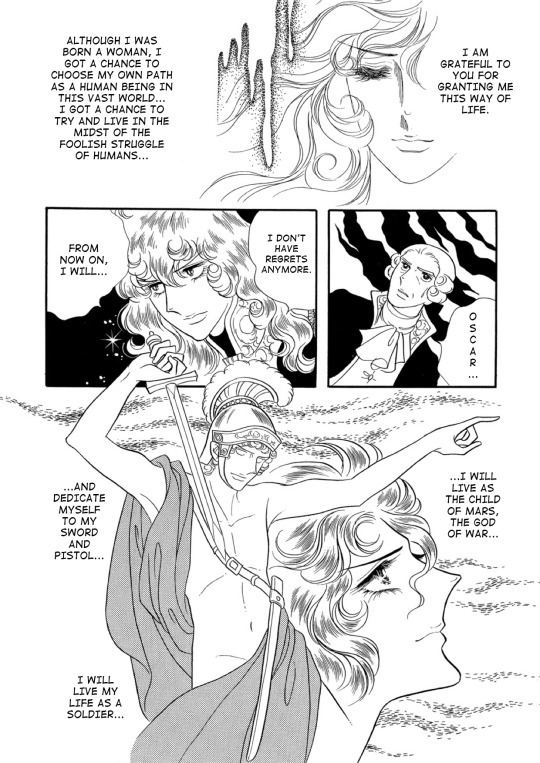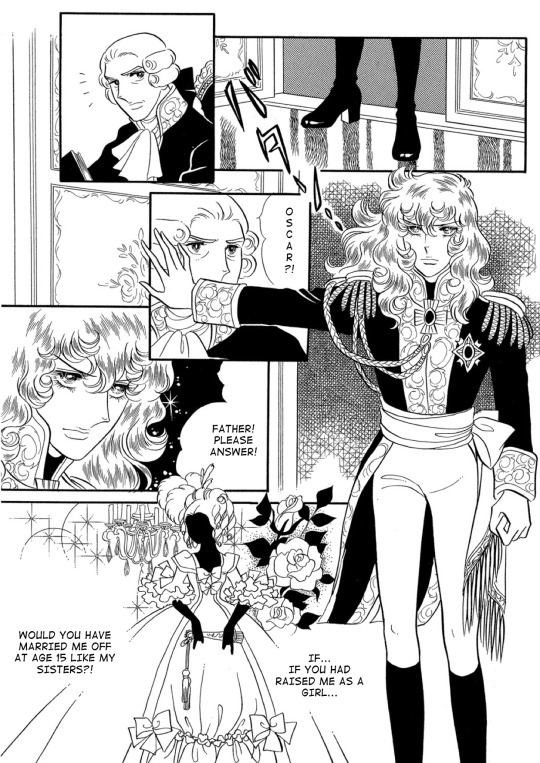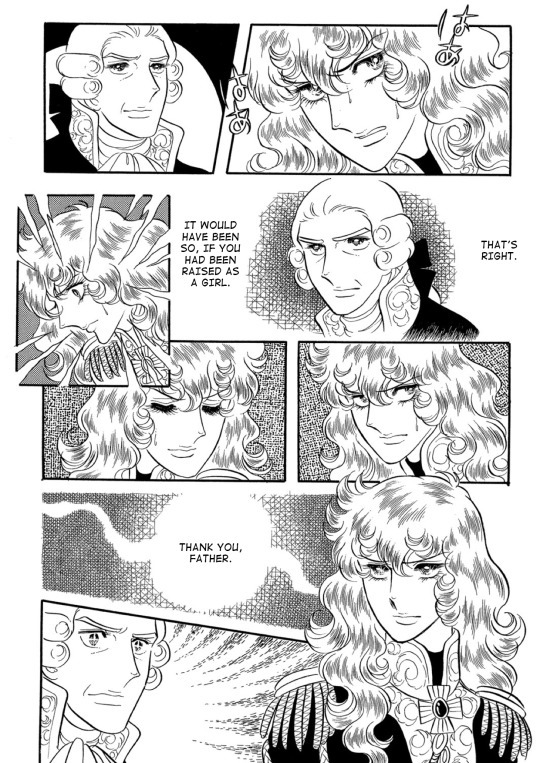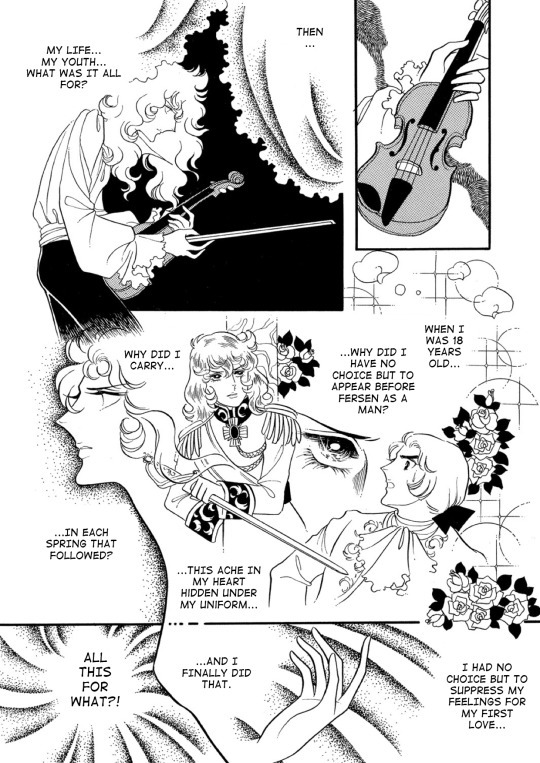#I guess it a subtitle punishment for them starting the revolution-
Text
Why does Oscar choose to live her life as a man?
The anime of The Rose of Versailles starts off very differently from the manga. The pilot episode introduces Oscar and features the events that lead to her decision to wear the military uniform and become Commander of the Royal Guards, charged with protecting Marie-Antoinette.
The act of donning the uniform symbolises that Oscar decides to leave aside her womanhood once and for all and to lead the rest of her life as a man. The episode emphasizes the fact that Oscar consciously chooses her path after much soul-searching. However, it does not explain how Oscar finally makes her decision or why she makes that particular decision. Here, I will attempt to fill in those blanks.
Disclaimer: The anime scripts have been taken from the subtitles in the North American DVD release by Right Stuf, via Nozomi Entertainment.
The manga scanlations are made by me based on the original Japanese text and the official French translation. They are bound to be clumsy as English is not my mother tongue and as I am not proficient in either Japanese or French. Having thus broken all the rules of the translation world, I hope I was able to convey the gist of the meaning enough to make my point.
Needless to say, The Rose of Versailles is copyright Riyoko Ikeda. I don’t have any claim over the story, characters, manga, anime, designs, etc. These stills and script from the anime, and scans from the manga, are featured here for only for the purpose of providing insight into the subject matter I am attempting to analyse in this post.
***
So why does Oscar choose to live her life as a man?
Like every young heir being prepared for a military career, I suppose that Oscar was engrained with a notion of what an ideal man is from childhood. In episode 28 ("André, a Green Lemon"), she alludes to this ideal:
In this scene, after riding her horse to exhaustion to let out her frustration, Oscar brings her mount to back to the stable, followed by André. Her eye catches her name scratched on the wall.

OSCAR
Do you remember these scratch marks on this the wall?
ANDRE
Yeah, I remember. It was around the time when I first came to this manor. It’s the scratch marks from us measuring our height.
OSCAR
That was 23 years ago. I didn’t have a shadow of a doubt that I was a boy back then. I still hadn’t known what love or falling in love meant.
OSCAR
I was brought up as a man. There’d be nothing strange if I lived the rest of my life, even more so, as a man. That’s why I’m going to leave the Royal Guards. I want to live as a man! Being a woman… These emotions… I want to forget it all! I want a mission that only a man could do! I couldn’t care less if I were an infantry soldier! I want to carry a gun, cross the river and fight the enemy! I want my days to be spent risking my life in the line of duty, without love or romance! I want to live more like a man! I’m going to return to those days, when I believed I was a boy. I swear, I will!
This scene gives us an idea about Oscar’s perception of the ideal man: a tough, strong, duty-bound soldier who dedicates himself to fighting the enemy and has no room for anything else in his life.
Also in this scene, Oscar admits to herself that she hasn’t been able to live up to this ideal. She fell in love with Fersen and was later heartbroken. She blames her womanhood, which she regards as a weakness, for straying from this ideal and strives to get back on track. She believes that once she achieves this ideal, everything will be all right and she won’t suffer anymore.
Then in episode 30 (“You’re the Light, I’m the Shadow”), General Jarjayes tearfully admits to Oscar that he regrets his decision to raise her daughter as his son because it caused her to face unnecessary hardships, and asks for her forgiveness. Evidently not expecting such an emotional outburst from her father, Oscar is momentarily taken aback. Then, she sits back in her chair and plucks out a single white rose from the vase in front of her. As she distractedly pulls off the petals of the rose, she calmly says, “Father, please don’t worry. I didn’t abandon my womanhood as much as you think. I even fell madly in love as a woman once. In fact, I’m very grateful to you, Father. Because you raised me as a man, I’m able to forget everything and live strongly.”

Here, Oscar’s calm acknowledgment of her femininity is in stark contrast to her fervent assertions back in episode 28. She seems to have calmed down and to be more at peace with her womanhood. However, the reason why I wanted to mention this scene here is the bit about ‘forgetting about everything else and living stronger.’
I think what Oscar means by it is that her upbringing as a man has allowed her to better cope with the hardships in her life. She can take action or has the resources to take action in the face of conflict because she was raised as a man, while if she had been raised as a woman, she would have been helpless to take action or she would have had to ask a man to do so in her stead.
Take the duel with the Duke de Guéméné. The cruel Duke catches a poor little boy in the slums of Paris, trying to steal his money. Rosalie pleads with him to forgive the child this once as he attempted theft because he hadn’t eaten in days. The Duke seemingly forgives the boy, but then shoots him in the back, killing him instantly. Witnessing the scene, Oscar is outraged. She doesn’t issue a challenge right away, but she certainly taunts the Duke. Perhaps since the Duke’s rank is higher than Oscar’s, he could refuse Oscar’s challenge to a duel and she didn’t want to risk that.
If Oscar were raised as a woman, I’m guessing that it would be more difficult for her to stand up to the Duke, who would then have to challenge her father or her husband to a duel.
Although we are talking about the anime here, I thought the manga could provide some insight as well. In chapter 6 (“The Burning Flames of Revolution”), Oscar again thanks her father for raising her as a man and says to him something along the lines of how being raised the way she was has allowed her to live as a human being in this vast world in the midst of the foolish struggles of humans, although she was born female. It doesn’t make much sense to me, but this is what I could come up with.
As much as it is sad, Oscar has got a point about how being raised as a man allowed her to live as a ‘human being,’ as if women are not humans. Even today, the women’s rights movement worldwide is still trying to establish the most basic notion that women are human beings just like men are.
The scene continues with Oscar saying to General Jarjayes, “I don’t have regrets anymore. From now on, I will live as the child of Mars, the God of War, and dedicate myself to my sword and pistol. I will live my life as a soldier.” This statement mirrors the one she makes above in episode 28.


However, it is important to note that, in the manga, Oscar’s confrontation with her father takes place after the mob attack in Paris, meaning after Oscar realises for the first time that she might harbour feelings for André. It also takes place after Girodelle confronts Oscar squarely, asking her without preliminaries if she is in love with André, to which she responds by saying, “I don’t know.”
This tells me that although she has realised that she might have feelings for André, she has no intention of acting on them. Until she can’t help herself anymore, after seeing how André is willing to sacrifice himself for her in the famous incident with General Jarjayes’ attempt to punish Oscar for her disobedience.
Judging from the way Oscar has carried with her this dedication to walk the path of the duty-bound soldier well into her adult years, General Jarjayes must have done everything he can to make sure his daughter aspired to become this ideal man.
I imagine that spending fourteen years, devoid of almost any female influence, being trained and preached to be a soldier would have a lasting effect on any young girl, for lack of knowing any better, if for nothing else. I don’t think Oscar grew up with any female role models around. She wouldn’t even be able to imagine a life spent as a woman for herself. Just look at how shocked she is when, as an adult, she realizes that if her father hadn’t decided to raise her as his son, her life would have been just like her sisters’.



With her upbringing, the fourteen-year-old Oscar would have rebelled fiercely against being constricted to the traditional gender roles of the time for women.
Note that Oscar does rebel, as an adult, when General Jarjayes has a sudden change of heart and decides to marry Oscar off. But her rebellion is tinged with sadness because she has already known as a woman what it is like to fall hopelessly in love with a man. Then, with good reason, she asks herself this question:

On the other hand, Oscar is a headstrong, stubborn and rebellious character, a fighter in spirit. Even if she were raised as a woman, I believe that she would have resisted just as fiercely against being forced into any traditional role for women if she didn’t want it herself.
[EDIT 27/01/2018]: Take this particular (watercolour!) scene from chapter 5 (“Oscar’s Suffering”). When patrolling the grounds of Versailles with the French Guards one night, Oscar runs into Fersen, obviously returning from a secret assignation with Marie-Antoinette (Just ignore the strip with Alain and the other guards). After getting over the initial shock of seeing him after such a long time, Oscar sends him safely on his way. Then, her mind wanders to Marie-Antoinette and to the fact that the queen doesn’t have the freedom to take control over her own life. By her own admission, Oscar can’t imagine herself in her shoes.

[/EDIT]
However, if Oscar were raised as a woman, I imagine that her resistance to conform with what is expected of her would not be deemed legitimate or, let’s say, would be deemed less legitimate, because she is already born and raised as a woman, not born as a woman but raised as a man.
Knowing herself, perhaps Oscar thought that living her life as a man would better suit her independent personality. Perhaps she finally chose to lead her life as a man because she thought that it would give her a lot more freedom that she wouldn’t have had as a woman.
One can then, of course, question how much freedom she had as a man, as a duty-bound soldier, compared to how much freedom she would have had as a woman, as a lady of the court. Needless to say, Oscar, as a man, isn’t free to abandon her military duties or break her allegiance to the crown of France, let alone join the revolutionists. What I mean by freedom in this context is that Oscar, as a man, has the right to have an opinion and is asked for her opinion. She can make her own decisions, as well as decisions that will affect others. She behaves with confidence among other men, knowing that they accept her as one of them, as their equal. She also has freedom of movement without needing a chaperone, thus she spends more time outdoors and leads a more active life. The list goes on.
In conclusion, the answer to the question of why Oscar finally chose to lead her life as a man has lain in Oscar’s own words all along: At the end of episode 1 “Oscar, the Destiny of the Rose,” she tells her father in her mind that she has chosen this path not for him or for anyone else, but for herself only. Oscar decides that she can be more “herself” if she lived as a man.
#oscar françois de jarjayes#rose of versailles#berusaiyu no bara#lady oscar#gender#choice#man or woman#analysis#versailles no bara
212 notes
·
View notes
Text
DiDio Says Dark Matter Is The First Step In Diversifying The DCU
Today, DC Comics revealed its next major publishing initiative: a run of brand-new comics starring new characters branded as Dark Matter.
But while the headlines of the initiative will draw eyeballs with its list of all-star artists and writers, the real question surrounding Dark Matter is how it will fit in and find an audience in a changing comics marketplace. To answer these questions, DC Co-Publishers Dan DiDio and Jim Lee as well as Dark Matter artists John Romita, Jr., Greg Capullo and Andy Kubert met with a small group of press during Diamond Comic Distributor’s Retailer Summit (itself a prelude to this year’s C2E2 convention in Chicago).
At the press roundtable, DiDio and Lee spelled out their major plans for Dark Matter including its newly buzz-worthy practice of putting artists out front, its relation to DC’s Rebirth initiative, its potential to diversify the line both on and off the page, and its chances for sales success in a soft market.
RELATED: Full Details of DC’s New Dark Matter Line
Conceptually, books with the Dark Matter branding will serve two roles. First, the books offer up brand-new characters and concepts created collaboratively by some of the publisher’s top talent. But aside from that general “newness,” the creators stressed that there is a stylistic flourish here that will set these series apart from previous launches. “All this stuff is set in the DC Universe,” Lee explained, but that doesn’t necessarily make them straight superhero stories. He promised that all the series would be influenced by everything from action to science fiction to horror tropes, bringing a new sensibility to their core line of titles.
DiDio backed this idea up, saying Dark Matter represents “a style and tone of comic book storytelling that embraces what we know and love about comics.” He said classic storytelling themes like secret identities and the price of power will merge with fanciful new worldbuilding opportunities that are bigger than anything seen on a movie screen.
Of course, any new comic launch today faces not only an expectation that the genre ideas in play will be different, but that the content on the page will represent a more diverse world and readership. The DC creators spoke to the idea of diversity in the line, but many of them stressed the idea that more diverse characters would come not from a mandate but from the organic process of artists making stories in the 21st century.
DiDio in particular drew a line between the recent Rebirth launch and Dark Matter saying, “Rebirth was satisfying the old fanbase. Dark Matter is about building new fans.” He felt that readers would be more interested in getting on board with these characters than previous attempts at recasting DC icons with new identities because there would be “no preconceived notions.”
Romita backed this claim up, noting that the new hero Silencer he’s creating with writer Dan Abnett is a female assassin, but that “I don’t think of it as a diversity item. I think of it as a new character.” The artist said that if a story like this would be attempted with, say, Marvel recreating the Punisher as Francine Castle, he’d understand how readers would question the integrity of the story. But when artists start with the goal of making something totally new, there were no restrictions or second guessing, adding that with original characters as the focus, “There have been great female characters and great characters of color over the years.”
So if letting diverse characters organically grow out of the story is an important factor for Dark Matter, then why not have a more diverse lineup of creators? Why not, one reporter asked, have more women working on these books? DiDio said that at this first phase of expansion, DC was “Counting on folks who have a track record to do this for us.” The publisher is betting that big name artists who have already move big numbers in comic shops will give Dark Matter its best chance for initial success. But that doesn’t mean a more diverse roster of creators won’t be coming onto DC titles and even Dark Matter titles in the future.
Both DiDio and Lee pointed at the company’s new talent workshop pushes as a place where more new and diverse creators will funnel into the line – including many women. With the four assembled artists leading DC’s new “Master Class” initiative, the skills and experience of the veterans will ideally help newer talent learn the ropes quicker.
Overall, readers should think of Dark Matter as “the first stage in a long plan to expand the company’s appeal and the marketplace…not just the DCU” DiDio said. He promised that in the months ahead, even more new titles and ideas would be coming that would include a very diverse talent lineup – at one point citing creators like “Supergirl: Being Super” artist Joëlle Jones as the kind of person that will be seen more and more in the future of DC’s line.
With this initial focus on market-proven stars at the lead of new characters, the obvious question came up as to whether Dark Matter’s rollout was at all a rebuke to recent talk from Marvel Comics about artists no longer proving a selling point for their comics. DiDio gave two responses to the idea. First, he rejected the notion coming from anyone that artists don’t sell books. “The names sell, and it’s important for us to lean on them to be as confident as possible,” he said. But he followed that up by noting that this launch was in the works long before the Marvel artists quote hit the web, and that DC is following its own market instincts here and not looking to poke its competitor in the eye.
The outspoke Romita, however, had a more pointed take on the question. “People have the impression that writers are the gods of this process: they are not…I actually take offense to that notion. The notion that artists can’t move the needle is insane. I think saying that about a writer too is insane. It’s collaboration,” he said. The artist further noted that he feels that Marvel’s reluctance to promote books based around an artist is more a result of the publisher’s refusal to pay for higher-priced, “name” artists. “Their sales are reflecting it,” he said of that attitude.
DiDio quickly steered things back towards his upbeat view of how DC will capitalize on the big names they’ve tapped for this launch. He said his view of superstar artists comes from the fact that he “sits next to Jim Lee” in his job and sees how much influence the longtime fan favorite has with his work to this day. He compared the idea of big name artists making a splash to the Image Revolution of the ’90s, which he’s fascinated with. When you match superstar creators with new ideas, it stops you from just “servicing the existing audience,” DiDio said, and he wants DC to be fearless about what they do in publishing. It’s not enough to simply do the same stories with the same heroes over and over.
But, one reporter asked, hasn’t this kind of launch been tried before and failed? What would make Dark Matter more sustainable than the moment when Jack Kirby came to DC with brand-new ideas and found little sales success, for example? DiDio said he felt that the energy of the new launch will be sustainable in multiple ways. “What we want to do is instill a style of storytelling and sensibility that works for Dark Matter, but can also work in the DCU as well,” he said, adding that the cutting edge sensibility of the books will carry their own energy beyond the star power headlining the first comics’ arrival. Not every artist co-creator may draw 50 issues of these new series, he said, but DC was dedicated to making these properties long term successes due to their creative energy.
The Co-Publishers also outlined the basics of how the rollout will arrive in shops and what incentives readers will have to get on board. Dark Matter is a branding – an overall concept for creativity at DC – but it does launch on the back of the Scott Snyder-led “Dark Days” event which itself arrives in the form of two one-shots subtitled “The Forge” in June and “The Casting” in July. From there, Capullo and Synder’s “Dark Nights: Metal” will hit in August followed by no more than two new titles per month until the end of the year.
DiDio caled it “A nice slow rollout” with a $2.99 price point on every title. As an extension of that, the Co-Publisher promised that each title would have another simplified selling point. “We’re going to do something extraordinarily dramatic…we’re going to put one cover on it!” he said. “This is a starting point for fans and a starting point for the characters, and you want it to have one thing for people to own…We want this one book to be as accessible to as many people as possible.”
The post DiDio Says Dark Matter Is The First Step In Diversifying The DCU appeared first on CBR.
http://ift.tt/2oVm8Ol
0 notes